Impact of Leadership Styles and Motivation on Employee Performance
VerifiedAdded on 2022/12/21
|14
|2638
|4
Report
AI Summary
This report investigates the impact of leadership styles and employee motivation on employee performance within the hospitality industry. It begins with an introduction outlining the context, problem statement, purpose, aims, research objectives, and research questions. The literature review explores leadership styles, employee motivation, and their combined impact on performance. The research methodology section details the descriptive research design, data collection methods (primary and secondary), sampling techniques, and ethical considerations. The report also includes a thesis structure and a project timetable. The study employs a descriptive research design, collecting data through questionnaires and secondary sources, with a focus on understanding how leadership styles influence employee motivation and, ultimately, performance in the hospitality sector. The research aims to identify the most influential leadership style and the extent to which it impacts employee performance. Ethical considerations, including informed consent and data confidentiality, are also addressed.
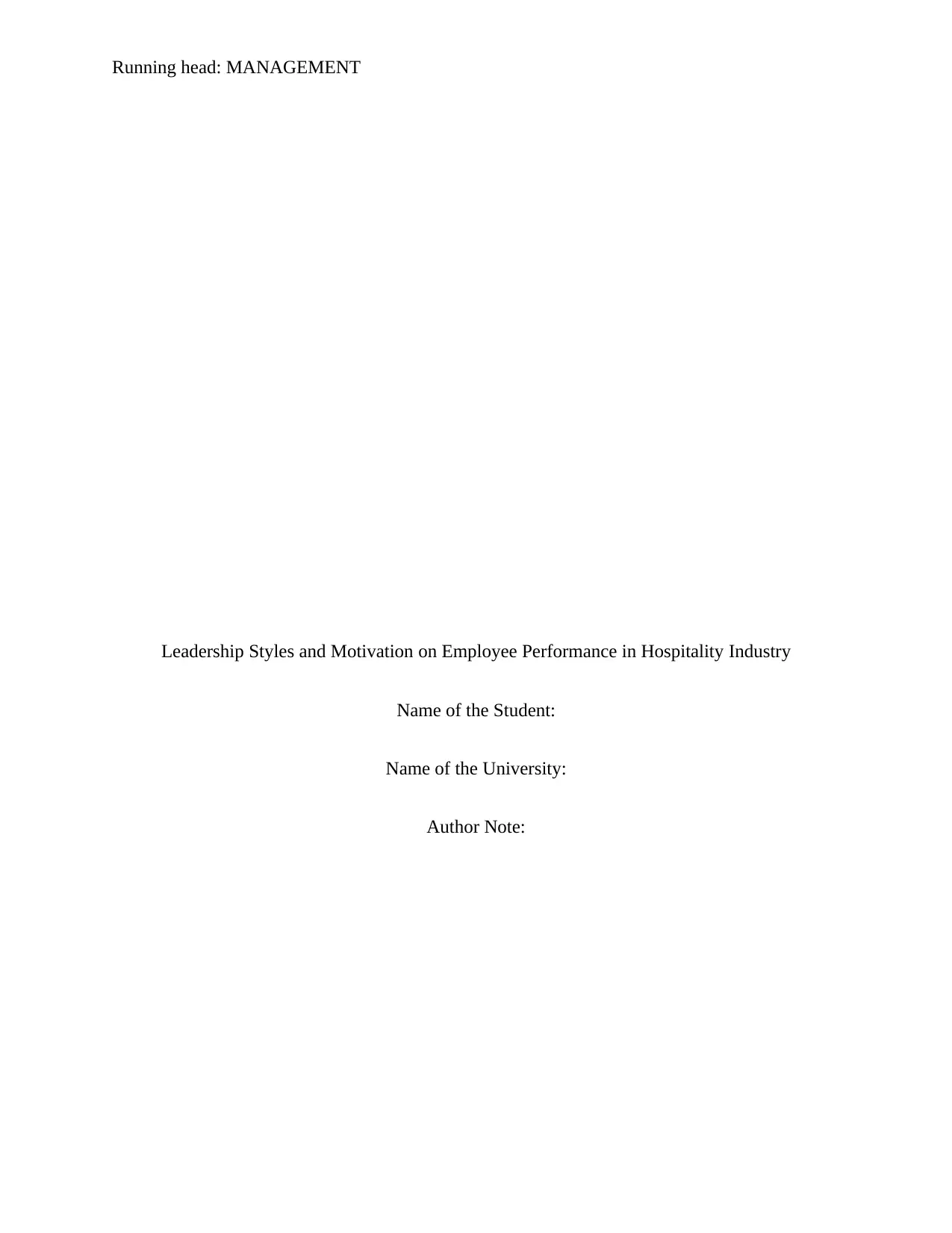
Running head: MANAGEMENT
Leadership Styles and Motivation on Employee Performance in Hospitality Industry
Name of the Student:
Name of the University:
Author Note:
Leadership Styles and Motivation on Employee Performance in Hospitality Industry
Name of the Student:
Name of the University:
Author Note:
Paraphrase This Document
Need a fresh take? Get an instant paraphrase of this document with our AI Paraphraser
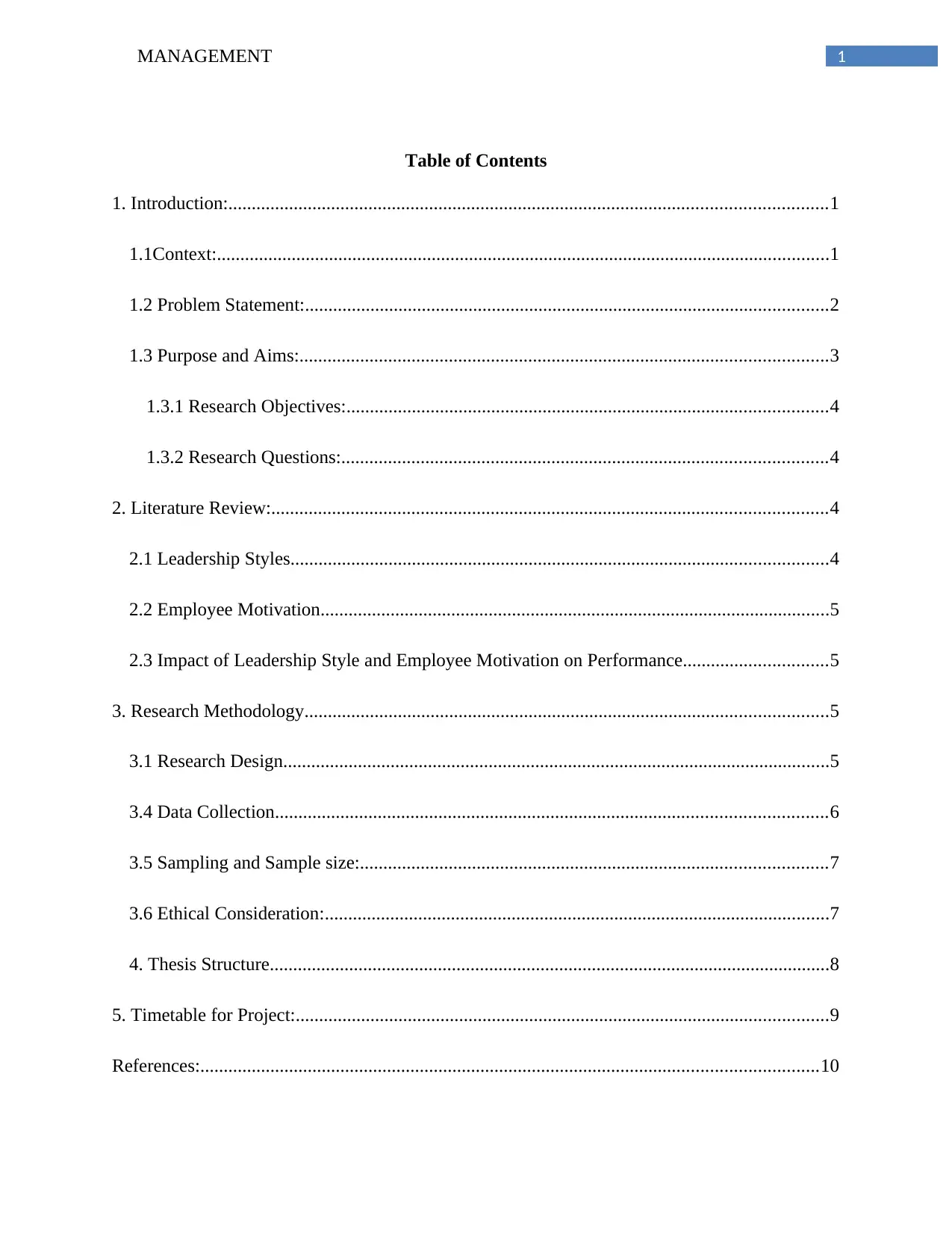
1MANAGEMENT
Table of Contents
1. Introduction:................................................................................................................................1
1.1Context:...................................................................................................................................1
1.2 Problem Statement:................................................................................................................2
1.3 Purpose and Aims:.................................................................................................................3
1.3.1 Research Objectives:.......................................................................................................4
1.3.2 Research Questions:........................................................................................................4
2. Literature Review:.......................................................................................................................4
2.1 Leadership Styles...................................................................................................................4
2.2 Employee Motivation.............................................................................................................5
2.3 Impact of Leadership Style and Employee Motivation on Performance...............................5
3. Research Methodology................................................................................................................5
3.1 Research Design.....................................................................................................................5
3.4 Data Collection......................................................................................................................6
3.5 Sampling and Sample size:....................................................................................................7
3.6 Ethical Consideration:............................................................................................................7
4. Thesis Structure........................................................................................................................8
5. Timetable for Project:..................................................................................................................9
References:....................................................................................................................................10
Table of Contents
1. Introduction:................................................................................................................................1
1.1Context:...................................................................................................................................1
1.2 Problem Statement:................................................................................................................2
1.3 Purpose and Aims:.................................................................................................................3
1.3.1 Research Objectives:.......................................................................................................4
1.3.2 Research Questions:........................................................................................................4
2. Literature Review:.......................................................................................................................4
2.1 Leadership Styles...................................................................................................................4
2.2 Employee Motivation.............................................................................................................5
2.3 Impact of Leadership Style and Employee Motivation on Performance...............................5
3. Research Methodology................................................................................................................5
3.1 Research Design.....................................................................................................................5
3.4 Data Collection......................................................................................................................6
3.5 Sampling and Sample size:....................................................................................................7
3.6 Ethical Consideration:............................................................................................................7
4. Thesis Structure........................................................................................................................8
5. Timetable for Project:..................................................................................................................9
References:....................................................................................................................................10
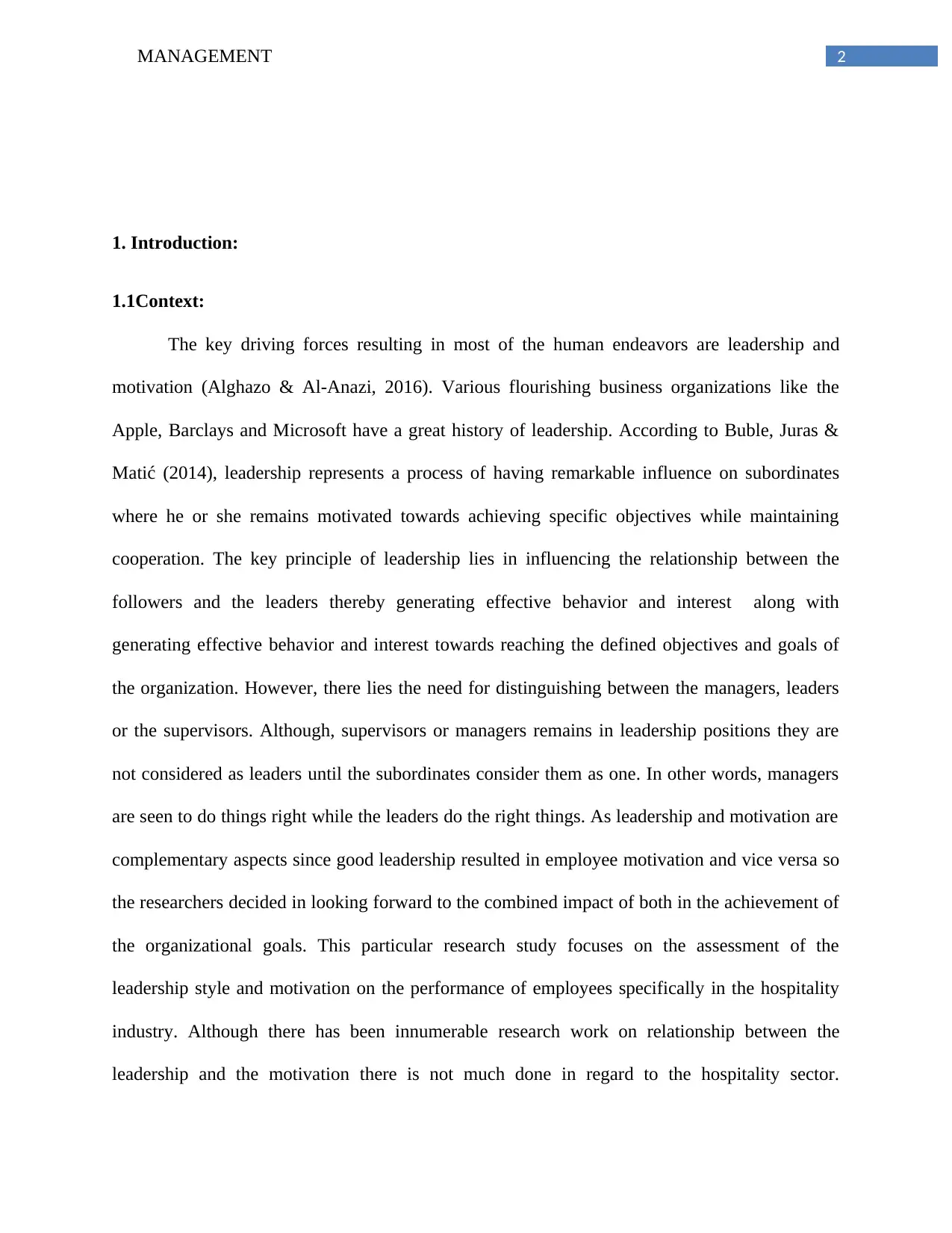
2MANAGEMENT
1. Introduction:
1.1Context:
The key driving forces resulting in most of the human endeavors are leadership and
motivation (Alghazo & Al-Anazi, 2016). Various flourishing business organizations like the
Apple, Barclays and Microsoft have a great history of leadership. According to Buble, Juras &
Matić (2014), leadership represents a process of having remarkable influence on subordinates
where he or she remains motivated towards achieving specific objectives while maintaining
cooperation. The key principle of leadership lies in influencing the relationship between the
followers and the leaders thereby generating effective behavior and interest along with
generating effective behavior and interest towards reaching the defined objectives and goals of
the organization. However, there lies the need for distinguishing between the managers, leaders
or the supervisors. Although, supervisors or managers remains in leadership positions they are
not considered as leaders until the subordinates consider them as one. In other words, managers
are seen to do things right while the leaders do the right things. As leadership and motivation are
complementary aspects since good leadership resulted in employee motivation and vice versa so
the researchers decided in looking forward to the combined impact of both in the achievement of
the organizational goals. This particular research study focuses on the assessment of the
leadership style and motivation on the performance of employees specifically in the hospitality
industry. Although there has been innumerable research work on relationship between the
leadership and the motivation there is not much done in regard to the hospitality sector.
1. Introduction:
1.1Context:
The key driving forces resulting in most of the human endeavors are leadership and
motivation (Alghazo & Al-Anazi, 2016). Various flourishing business organizations like the
Apple, Barclays and Microsoft have a great history of leadership. According to Buble, Juras &
Matić (2014), leadership represents a process of having remarkable influence on subordinates
where he or she remains motivated towards achieving specific objectives while maintaining
cooperation. The key principle of leadership lies in influencing the relationship between the
followers and the leaders thereby generating effective behavior and interest along with
generating effective behavior and interest towards reaching the defined objectives and goals of
the organization. However, there lies the need for distinguishing between the managers, leaders
or the supervisors. Although, supervisors or managers remains in leadership positions they are
not considered as leaders until the subordinates consider them as one. In other words, managers
are seen to do things right while the leaders do the right things. As leadership and motivation are
complementary aspects since good leadership resulted in employee motivation and vice versa so
the researchers decided in looking forward to the combined impact of both in the achievement of
the organizational goals. This particular research study focuses on the assessment of the
leadership style and motivation on the performance of employees specifically in the hospitality
industry. Although there has been innumerable research work on relationship between the
leadership and the motivation there is not much done in regard to the hospitality sector.
⊘ This is a preview!⊘
Do you want full access?
Subscribe today to unlock all pages.

Trusted by 1+ million students worldwide
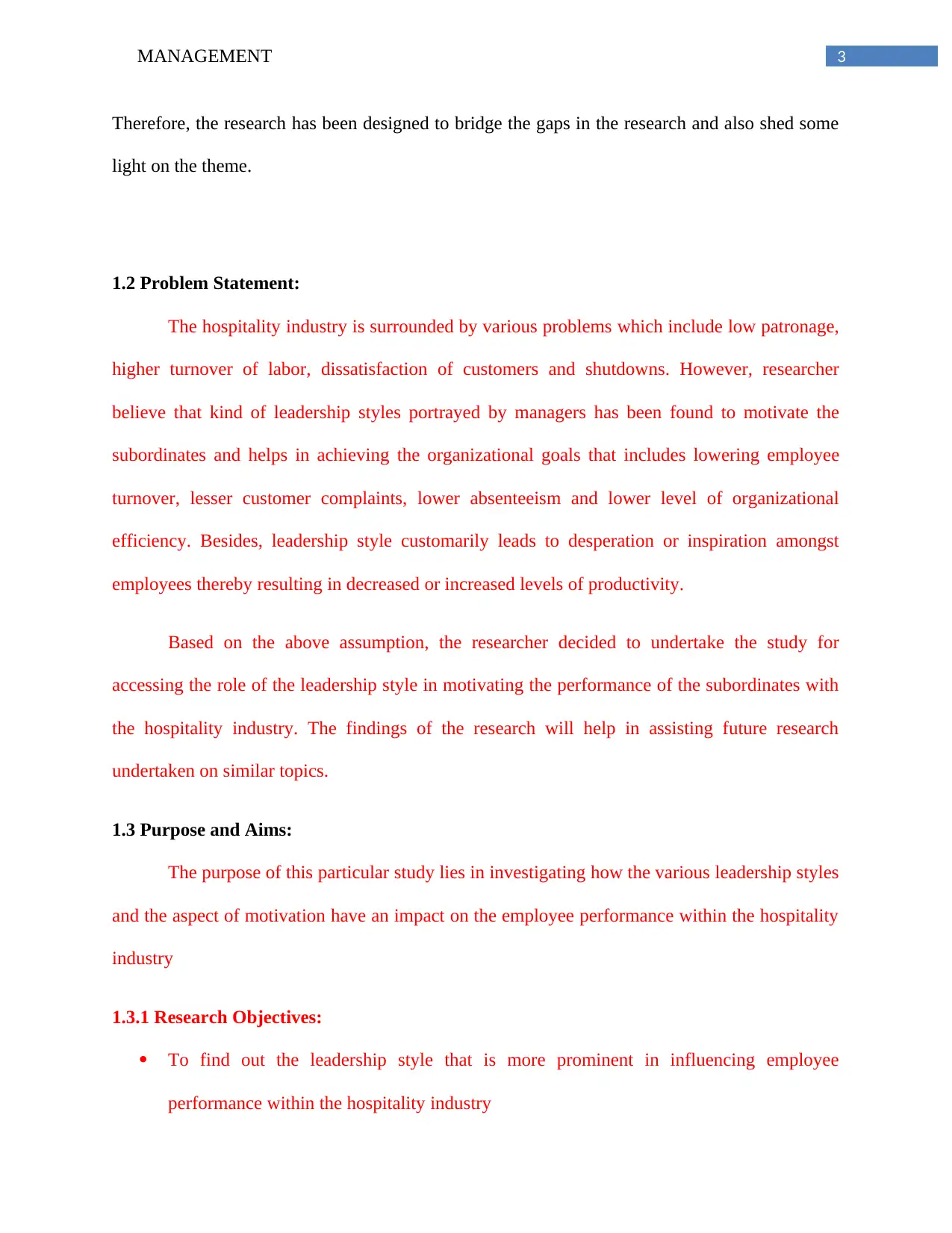
3MANAGEMENT
Therefore, the research has been designed to bridge the gaps in the research and also shed some
light on the theme.
1.2 Problem Statement:
The hospitality industry is surrounded by various problems which include low patronage,
higher turnover of labor, dissatisfaction of customers and shutdowns. However, researcher
believe that kind of leadership styles portrayed by managers has been found to motivate the
subordinates and helps in achieving the organizational goals that includes lowering employee
turnover, lesser customer complaints, lower absenteeism and lower level of organizational
efficiency. Besides, leadership style customarily leads to desperation or inspiration amongst
employees thereby resulting in decreased or increased levels of productivity.
Based on the above assumption, the researcher decided to undertake the study for
accessing the role of the leadership style in motivating the performance of the subordinates with
the hospitality industry. The findings of the research will help in assisting future research
undertaken on similar topics.
1.3 Purpose and Aims:
The purpose of this particular study lies in investigating how the various leadership styles
and the aspect of motivation have an impact on the employee performance within the hospitality
industry
1.3.1 Research Objectives:
To find out the leadership style that is more prominent in influencing employee
performance within the hospitality industry
Therefore, the research has been designed to bridge the gaps in the research and also shed some
light on the theme.
1.2 Problem Statement:
The hospitality industry is surrounded by various problems which include low patronage,
higher turnover of labor, dissatisfaction of customers and shutdowns. However, researcher
believe that kind of leadership styles portrayed by managers has been found to motivate the
subordinates and helps in achieving the organizational goals that includes lowering employee
turnover, lesser customer complaints, lower absenteeism and lower level of organizational
efficiency. Besides, leadership style customarily leads to desperation or inspiration amongst
employees thereby resulting in decreased or increased levels of productivity.
Based on the above assumption, the researcher decided to undertake the study for
accessing the role of the leadership style in motivating the performance of the subordinates with
the hospitality industry. The findings of the research will help in assisting future research
undertaken on similar topics.
1.3 Purpose and Aims:
The purpose of this particular study lies in investigating how the various leadership styles
and the aspect of motivation have an impact on the employee performance within the hospitality
industry
1.3.1 Research Objectives:
To find out the leadership style that is more prominent in influencing employee
performance within the hospitality industry
Paraphrase This Document
Need a fresh take? Get an instant paraphrase of this document with our AI Paraphraser
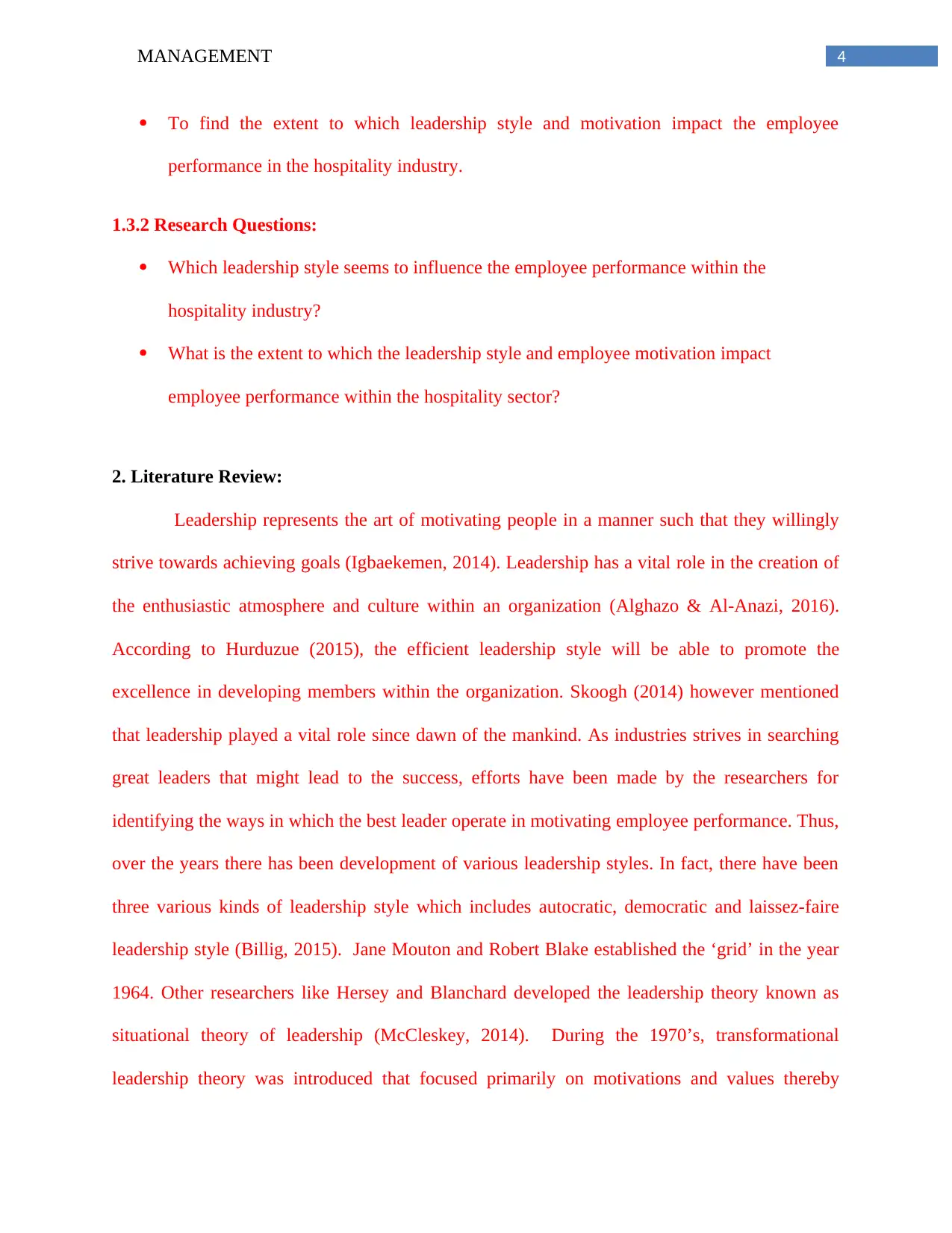
4MANAGEMENT
To find the extent to which leadership style and motivation impact the employee
performance in the hospitality industry.
1.3.2 Research Questions:
Which leadership style seems to influence the employee performance within the
hospitality industry?
What is the extent to which the leadership style and employee motivation impact
employee performance within the hospitality sector?
2. Literature Review:
Leadership represents the art of motivating people in a manner such that they willingly
strive towards achieving goals (Igbaekemen, 2014). Leadership has a vital role in the creation of
the enthusiastic atmosphere and culture within an organization (Alghazo & Al-Anazi, 2016).
According to Hurduzue (2015), the efficient leadership style will be able to promote the
excellence in developing members within the organization. Skoogh (2014) however mentioned
that leadership played a vital role since dawn of the mankind. As industries strives in searching
great leaders that might lead to the success, efforts have been made by the researchers for
identifying the ways in which the best leader operate in motivating employee performance. Thus,
over the years there has been development of various leadership styles. In fact, there have been
three various kinds of leadership style which includes autocratic, democratic and laissez-faire
leadership style (Billig, 2015). Jane Mouton and Robert Blake established the ‘grid’ in the year
1964. Other researchers like Hersey and Blanchard developed the leadership theory known as
situational theory of leadership (McCleskey, 2014). During the 1970’s, transformational
leadership theory was introduced that focused primarily on motivations and values thereby
To find the extent to which leadership style and motivation impact the employee
performance in the hospitality industry.
1.3.2 Research Questions:
Which leadership style seems to influence the employee performance within the
hospitality industry?
What is the extent to which the leadership style and employee motivation impact
employee performance within the hospitality sector?
2. Literature Review:
Leadership represents the art of motivating people in a manner such that they willingly
strive towards achieving goals (Igbaekemen, 2014). Leadership has a vital role in the creation of
the enthusiastic atmosphere and culture within an organization (Alghazo & Al-Anazi, 2016).
According to Hurduzue (2015), the efficient leadership style will be able to promote the
excellence in developing members within the organization. Skoogh (2014) however mentioned
that leadership played a vital role since dawn of the mankind. As industries strives in searching
great leaders that might lead to the success, efforts have been made by the researchers for
identifying the ways in which the best leader operate in motivating employee performance. Thus,
over the years there has been development of various leadership styles. In fact, there have been
three various kinds of leadership style which includes autocratic, democratic and laissez-faire
leadership style (Billig, 2015). Jane Mouton and Robert Blake established the ‘grid’ in the year
1964. Other researchers like Hersey and Blanchard developed the leadership theory known as
situational theory of leadership (McCleskey, 2014). During the 1970’s, transformational
leadership theory was introduced that focused primarily on motivations and values thereby
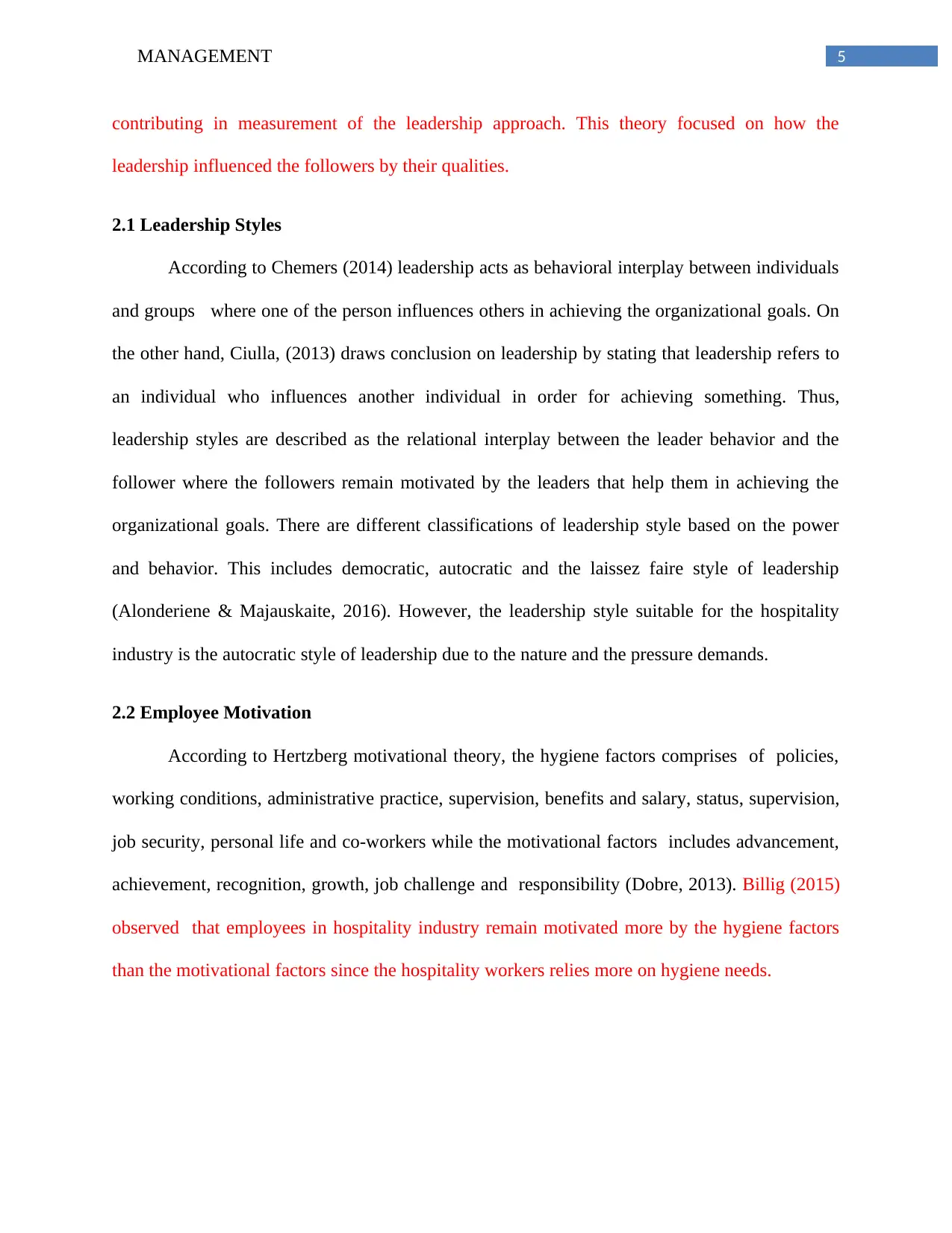
5MANAGEMENT
contributing in measurement of the leadership approach. This theory focused on how the
leadership influenced the followers by their qualities.
2.1 Leadership Styles
According to Chemers (2014) leadership acts as behavioral interplay between individuals
and groups where one of the person influences others in achieving the organizational goals. On
the other hand, Ciulla, (2013) draws conclusion on leadership by stating that leadership refers to
an individual who influences another individual in order for achieving something. Thus,
leadership styles are described as the relational interplay between the leader behavior and the
follower where the followers remain motivated by the leaders that help them in achieving the
organizational goals. There are different classifications of leadership style based on the power
and behavior. This includes democratic, autocratic and the laissez faire style of leadership
(Alonderiene & Majauskaite, 2016). However, the leadership style suitable for the hospitality
industry is the autocratic style of leadership due to the nature and the pressure demands.
2.2 Employee Motivation
According to Hertzberg motivational theory, the hygiene factors comprises of policies,
working conditions, administrative practice, supervision, benefits and salary, status, supervision,
job security, personal life and co-workers while the motivational factors includes advancement,
achievement, recognition, growth, job challenge and responsibility (Dobre, 2013). Billig (2015)
observed that employees in hospitality industry remain motivated more by the hygiene factors
than the motivational factors since the hospitality workers relies more on hygiene needs.
contributing in measurement of the leadership approach. This theory focused on how the
leadership influenced the followers by their qualities.
2.1 Leadership Styles
According to Chemers (2014) leadership acts as behavioral interplay between individuals
and groups where one of the person influences others in achieving the organizational goals. On
the other hand, Ciulla, (2013) draws conclusion on leadership by stating that leadership refers to
an individual who influences another individual in order for achieving something. Thus,
leadership styles are described as the relational interplay between the leader behavior and the
follower where the followers remain motivated by the leaders that help them in achieving the
organizational goals. There are different classifications of leadership style based on the power
and behavior. This includes democratic, autocratic and the laissez faire style of leadership
(Alonderiene & Majauskaite, 2016). However, the leadership style suitable for the hospitality
industry is the autocratic style of leadership due to the nature and the pressure demands.
2.2 Employee Motivation
According to Hertzberg motivational theory, the hygiene factors comprises of policies,
working conditions, administrative practice, supervision, benefits and salary, status, supervision,
job security, personal life and co-workers while the motivational factors includes advancement,
achievement, recognition, growth, job challenge and responsibility (Dobre, 2013). Billig (2015)
observed that employees in hospitality industry remain motivated more by the hygiene factors
than the motivational factors since the hospitality workers relies more on hygiene needs.
⊘ This is a preview!⊘
Do you want full access?
Subscribe today to unlock all pages.

Trusted by 1+ million students worldwide
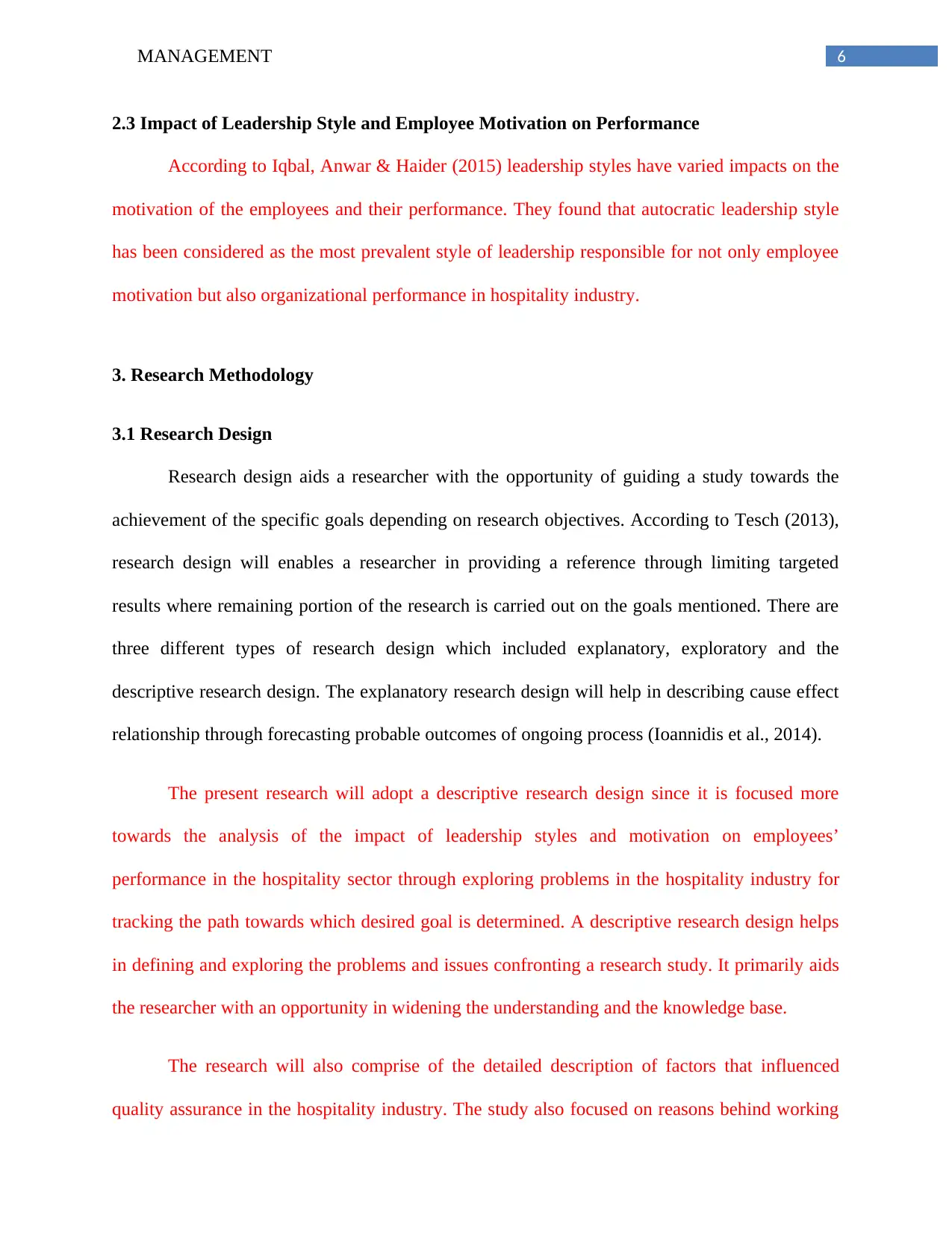
6MANAGEMENT
2.3 Impact of Leadership Style and Employee Motivation on Performance
According to Iqbal, Anwar & Haider (2015) leadership styles have varied impacts on the
motivation of the employees and their performance. They found that autocratic leadership style
has been considered as the most prevalent style of leadership responsible for not only employee
motivation but also organizational performance in hospitality industry.
3. Research Methodology
3.1 Research Design
Research design aids a researcher with the opportunity of guiding a study towards the
achievement of the specific goals depending on research objectives. According to Tesch (2013),
research design will enables a researcher in providing a reference through limiting targeted
results where remaining portion of the research is carried out on the goals mentioned. There are
three different types of research design which included explanatory, exploratory and the
descriptive research design. The explanatory research design will help in describing cause effect
relationship through forecasting probable outcomes of ongoing process (Ioannidis et al., 2014).
The present research will adopt a descriptive research design since it is focused more
towards the analysis of the impact of leadership styles and motivation on employees’
performance in the hospitality sector through exploring problems in the hospitality industry for
tracking the path towards which desired goal is determined. A descriptive research design helps
in defining and exploring the problems and issues confronting a research study. It primarily aids
the researcher with an opportunity in widening the understanding and the knowledge base.
The research will also comprise of the detailed description of factors that influenced
quality assurance in the hospitality industry. The study also focused on reasons behind working
2.3 Impact of Leadership Style and Employee Motivation on Performance
According to Iqbal, Anwar & Haider (2015) leadership styles have varied impacts on the
motivation of the employees and their performance. They found that autocratic leadership style
has been considered as the most prevalent style of leadership responsible for not only employee
motivation but also organizational performance in hospitality industry.
3. Research Methodology
3.1 Research Design
Research design aids a researcher with the opportunity of guiding a study towards the
achievement of the specific goals depending on research objectives. According to Tesch (2013),
research design will enables a researcher in providing a reference through limiting targeted
results where remaining portion of the research is carried out on the goals mentioned. There are
three different types of research design which included explanatory, exploratory and the
descriptive research design. The explanatory research design will help in describing cause effect
relationship through forecasting probable outcomes of ongoing process (Ioannidis et al., 2014).
The present research will adopt a descriptive research design since it is focused more
towards the analysis of the impact of leadership styles and motivation on employees’
performance in the hospitality sector through exploring problems in the hospitality industry for
tracking the path towards which desired goal is determined. A descriptive research design helps
in defining and exploring the problems and issues confronting a research study. It primarily aids
the researcher with an opportunity in widening the understanding and the knowledge base.
The research will also comprise of the detailed description of factors that influenced
quality assurance in the hospitality industry. The study also focused on reasons behind working
Paraphrase This Document
Need a fresh take? Get an instant paraphrase of this document with our AI Paraphraser
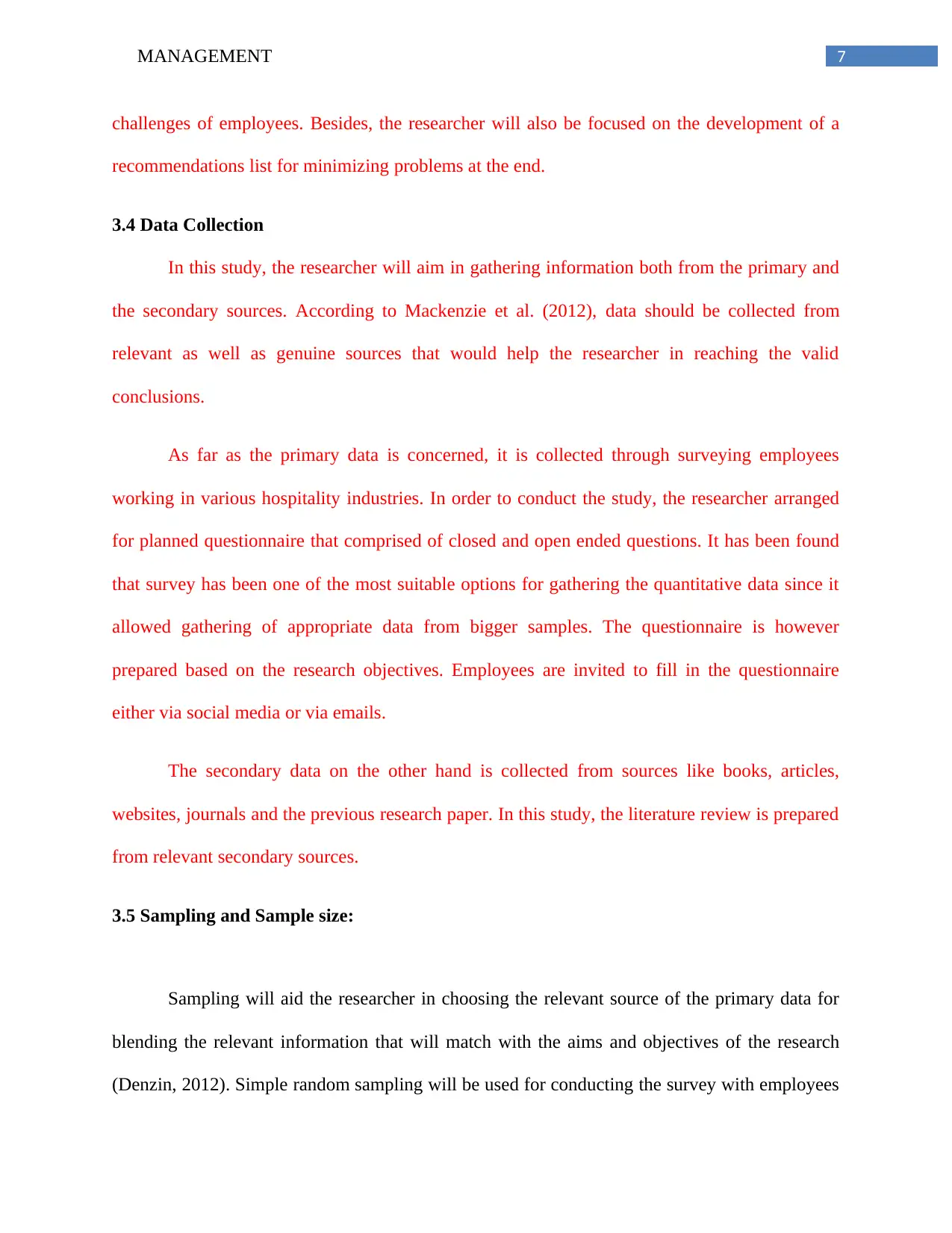
7MANAGEMENT
challenges of employees. Besides, the researcher will also be focused on the development of a
recommendations list for minimizing problems at the end.
3.4 Data Collection
In this study, the researcher will aim in gathering information both from the primary and
the secondary sources. According to Mackenzie et al. (2012), data should be collected from
relevant as well as genuine sources that would help the researcher in reaching the valid
conclusions.
As far as the primary data is concerned, it is collected through surveying employees
working in various hospitality industries. In order to conduct the study, the researcher arranged
for planned questionnaire that comprised of closed and open ended questions. It has been found
that survey has been one of the most suitable options for gathering the quantitative data since it
allowed gathering of appropriate data from bigger samples. The questionnaire is however
prepared based on the research objectives. Employees are invited to fill in the questionnaire
either via social media or via emails.
The secondary data on the other hand is collected from sources like books, articles,
websites, journals and the previous research paper. In this study, the literature review is prepared
from relevant secondary sources.
3.5 Sampling and Sample size:
Sampling will aid the researcher in choosing the relevant source of the primary data for
blending the relevant information that will match with the aims and objectives of the research
(Denzin, 2012). Simple random sampling will be used for conducting the survey with employees
challenges of employees. Besides, the researcher will also be focused on the development of a
recommendations list for minimizing problems at the end.
3.4 Data Collection
In this study, the researcher will aim in gathering information both from the primary and
the secondary sources. According to Mackenzie et al. (2012), data should be collected from
relevant as well as genuine sources that would help the researcher in reaching the valid
conclusions.
As far as the primary data is concerned, it is collected through surveying employees
working in various hospitality industries. In order to conduct the study, the researcher arranged
for planned questionnaire that comprised of closed and open ended questions. It has been found
that survey has been one of the most suitable options for gathering the quantitative data since it
allowed gathering of appropriate data from bigger samples. The questionnaire is however
prepared based on the research objectives. Employees are invited to fill in the questionnaire
either via social media or via emails.
The secondary data on the other hand is collected from sources like books, articles,
websites, journals and the previous research paper. In this study, the literature review is prepared
from relevant secondary sources.
3.5 Sampling and Sample size:
Sampling will aid the researcher in choosing the relevant source of the primary data for
blending the relevant information that will match with the aims and objectives of the research
(Denzin, 2012). Simple random sampling will be used for conducting the survey with employees
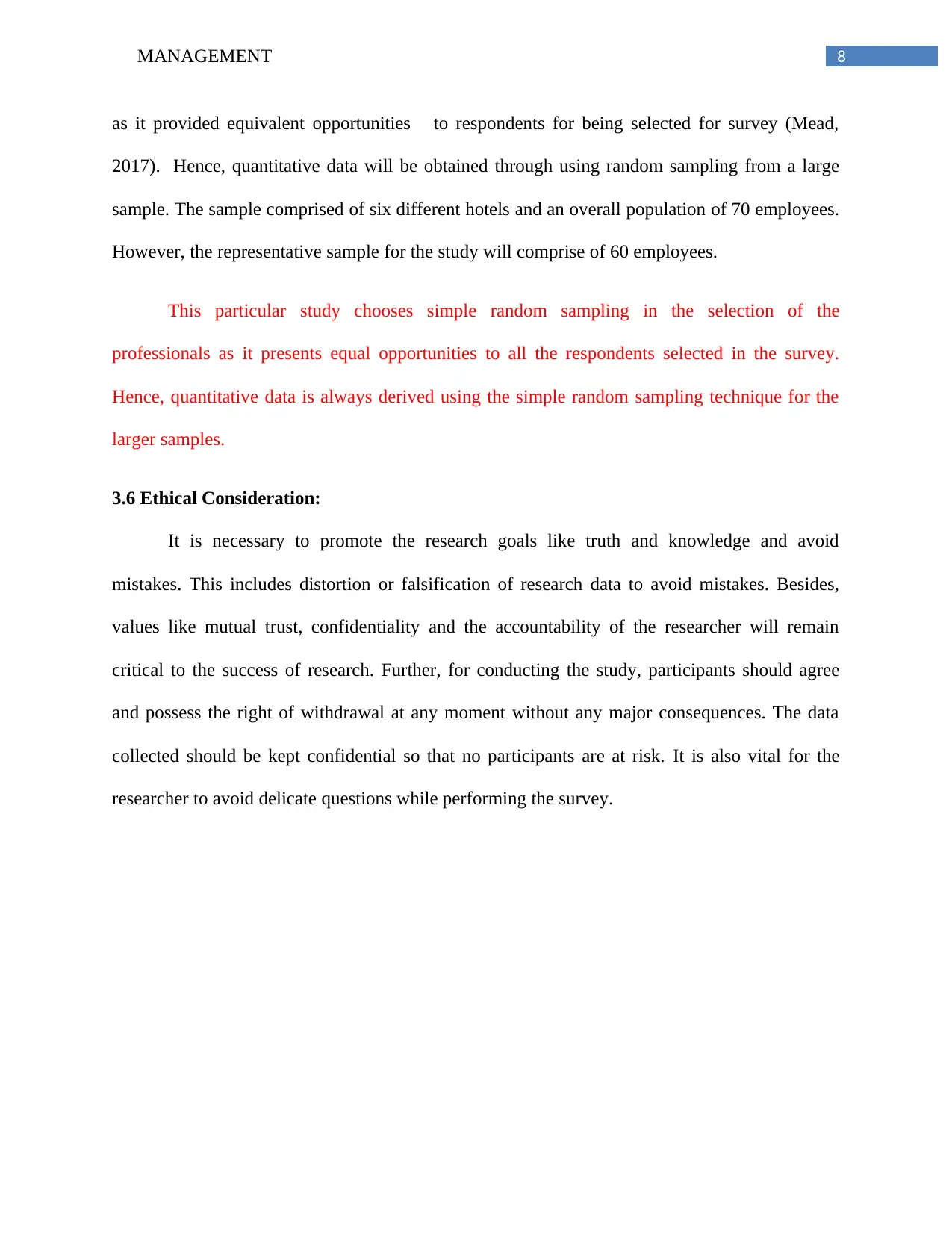
8MANAGEMENT
as it provided equivalent opportunities to respondents for being selected for survey (Mead,
2017). Hence, quantitative data will be obtained through using random sampling from a large
sample. The sample comprised of six different hotels and an overall population of 70 employees.
However, the representative sample for the study will comprise of 60 employees.
This particular study chooses simple random sampling in the selection of the
professionals as it presents equal opportunities to all the respondents selected in the survey.
Hence, quantitative data is always derived using the simple random sampling technique for the
larger samples.
3.6 Ethical Consideration:
It is necessary to promote the research goals like truth and knowledge and avoid
mistakes. This includes distortion or falsification of research data to avoid mistakes. Besides,
values like mutual trust, confidentiality and the accountability of the researcher will remain
critical to the success of research. Further, for conducting the study, participants should agree
and possess the right of withdrawal at any moment without any major consequences. The data
collected should be kept confidential so that no participants are at risk. It is also vital for the
researcher to avoid delicate questions while performing the survey.
as it provided equivalent opportunities to respondents for being selected for survey (Mead,
2017). Hence, quantitative data will be obtained through using random sampling from a large
sample. The sample comprised of six different hotels and an overall population of 70 employees.
However, the representative sample for the study will comprise of 60 employees.
This particular study chooses simple random sampling in the selection of the
professionals as it presents equal opportunities to all the respondents selected in the survey.
Hence, quantitative data is always derived using the simple random sampling technique for the
larger samples.
3.6 Ethical Consideration:
It is necessary to promote the research goals like truth and knowledge and avoid
mistakes. This includes distortion or falsification of research data to avoid mistakes. Besides,
values like mutual trust, confidentiality and the accountability of the researcher will remain
critical to the success of research. Further, for conducting the study, participants should agree
and possess the right of withdrawal at any moment without any major consequences. The data
collected should be kept confidential so that no participants are at risk. It is also vital for the
researcher to avoid delicate questions while performing the survey.
⊘ This is a preview!⊘
Do you want full access?
Subscribe today to unlock all pages.

Trusted by 1+ million students worldwide
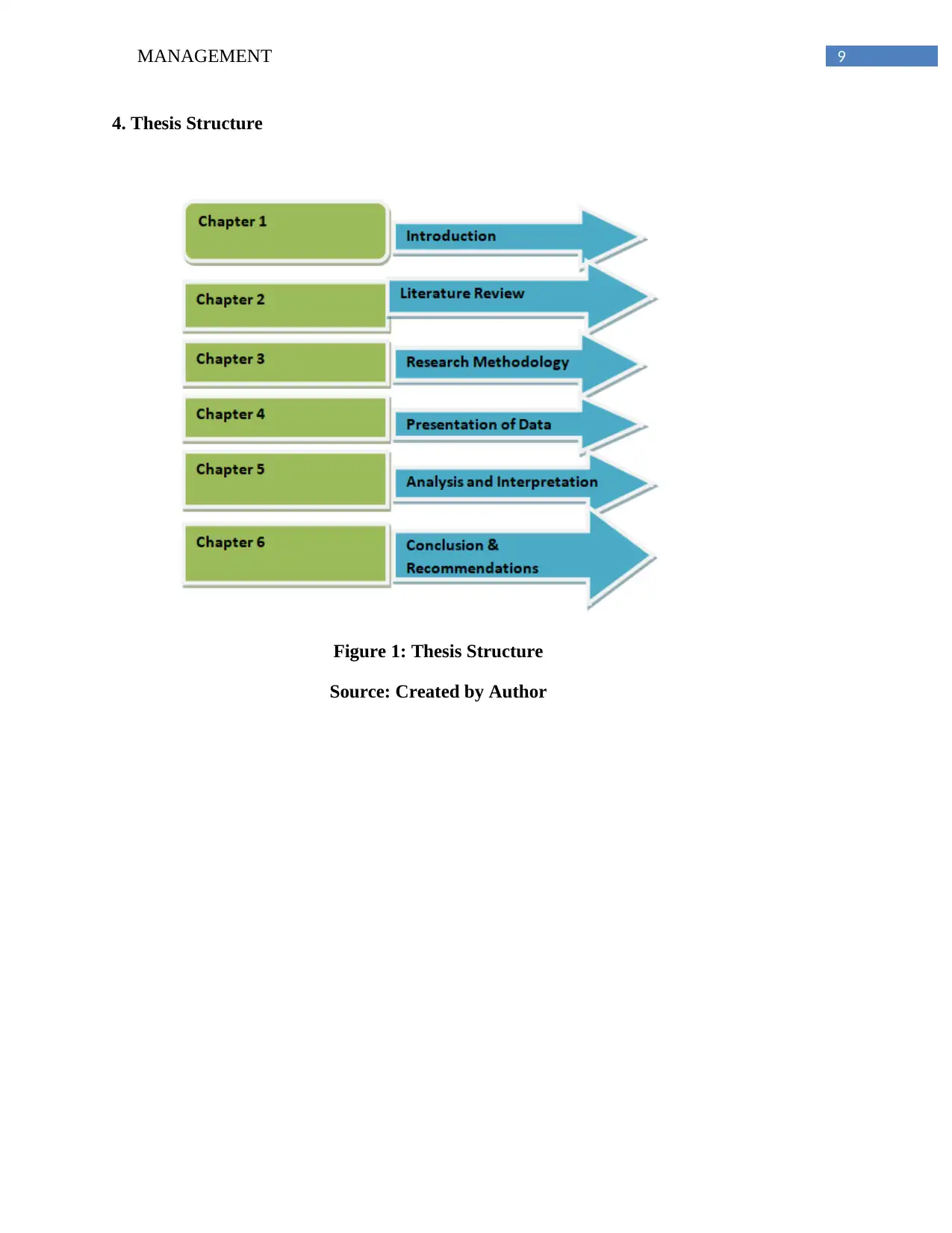
9MANAGEMENT
4. Thesis Structure
Figure 1: Thesis Structure
Source: Created by Author
4. Thesis Structure
Figure 1: Thesis Structure
Source: Created by Author
Paraphrase This Document
Need a fresh take? Get an instant paraphrase of this document with our AI Paraphraser
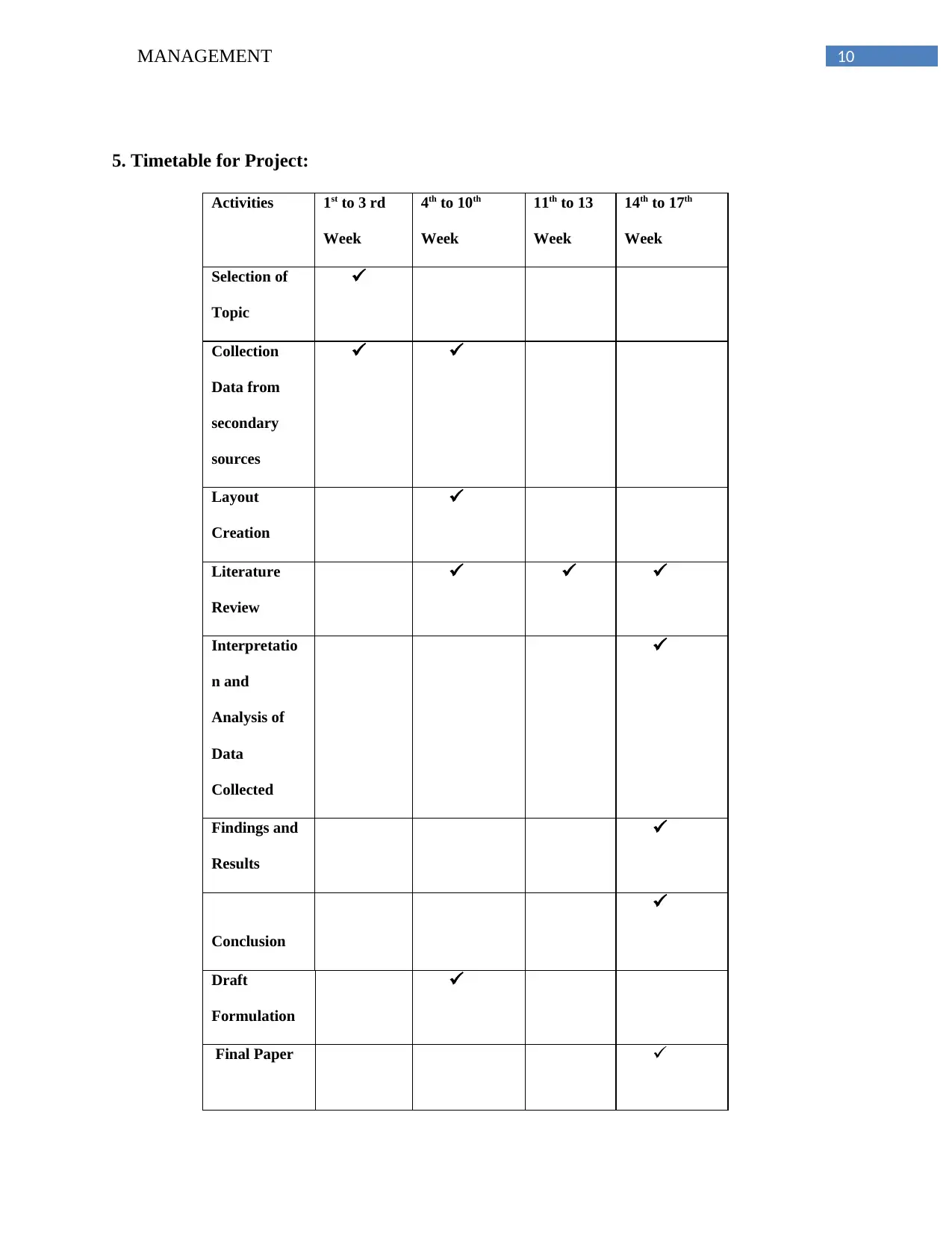
10MANAGEMENT
5. Timetable for Project:
Activities 1st to 3 rd
Week
4th to 10th
Week
11th to 13
Week
14th to 17th
Week
Selection of
Topic
Collection
Data from
secondary
sources
Layout
Creation
Literature
Review
Interpretatio
n and
Analysis of
Data
Collected
Findings and
Results
Conclusion
Draft
Formulation
Final Paper
5. Timetable for Project:
Activities 1st to 3 rd
Week
4th to 10th
Week
11th to 13
Week
14th to 17th
Week
Selection of
Topic
Collection
Data from
secondary
sources
Layout
Creation
Literature
Review
Interpretatio
n and
Analysis of
Data
Collected
Findings and
Results
Conclusion
Draft
Formulation
Final Paper
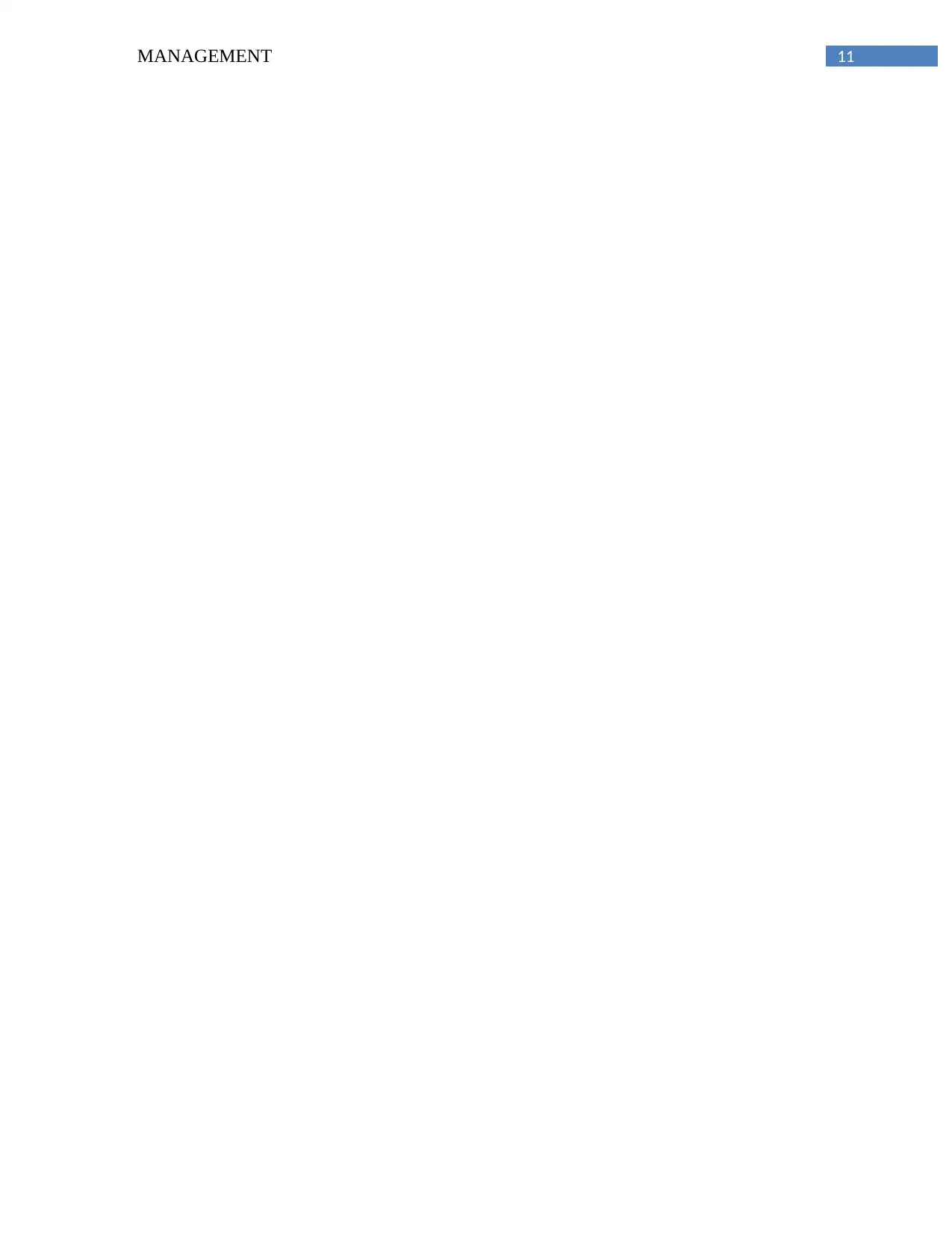
11MANAGEMENT
⊘ This is a preview!⊘
Do you want full access?
Subscribe today to unlock all pages.

Trusted by 1+ million students worldwide
1 out of 14
Related Documents
Your All-in-One AI-Powered Toolkit for Academic Success.
+13062052269
info@desklib.com
Available 24*7 on WhatsApp / Email
![[object Object]](/_next/static/media/star-bottom.7253800d.svg)
Unlock your academic potential
Copyright © 2020–2026 A2Z Services. All Rights Reserved. Developed and managed by ZUCOL.





